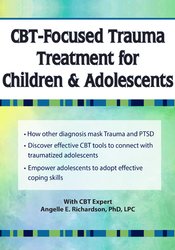
CBT-Focused Trauma Treatment for Children & Adolescents
Credit Available - See CEUs tab below.
- Categories:
- Children and Adolescent Behavioral | Cognitive Behavioral Therapies | Trauma
- Faculty:
- Angelle E. Richardson, PhD, LPC
- Duration:
- 6 Hours 07 Minutes
- Format:
- Audio and Video
- Original Program Date:
- 16 Feb, 2018
- SKU:
- POS053205
- Media Type:
- Online Learning
Description
- How other diagnosis mask Trauma and PTSD
- Discover effective CBT tools to connect with traumatized adolescents
- Empower adolescents to adopt effective coping skills
Hitting a sibling, yelling at parents, acting out in class, tuning-out, shouting, shoving, rebelling… all behaviors in a traumatized child or youth that can mask as ADHD, ODD or other clinical issues.
Recognizing and correctly assessing a traumatized child is the first step. In this seminar, you’ll learn:
- What assessment tools are available
- How to best use them
- When you are required (by law) to report the case, and the loss of trust with the child
From that foundation, learn trauma-informed CBT techniques that give children and adolescents tools to:
- Regulate their behavior
- Moderate the anxiety
- Develop coping skills
- Rebuild relationships so that they can feel safe and secure
CEUs
This course is available for 6.0 total CPDs.
The HPCSA has declared that any on-line courses CPD/CEU credited by a certified US board, is automatically CPD/CEU credited in South Africa.
As there are different boards for different disciplines, we at Acacia suggest that you use the Counselling CPD/CEU credits. These correspond to South African credits of one CPD/CEU per 60 minutes. If you choose to use your discipline's credits, please do so at your discretion.
PESI, Inc. is an approved provider with the Florida Board of Clinical Social Work, Marriage and Family Therapy and Mental Health Counseling. Provider Number 50-399. This self-study course qualifies for 6.25 continuing education credits.
Handouts
| File type | File name | Number of pages | |
|---|---|---|---|
| Manual (1.10 MB) | 49 Pages | Available after Purchase | |
| Free $50/$100 Coupons (5.27 MB) | Download |
Faculty
Angelle E. Richardson, PhD, LPC Related seminars and products
Angelle E. Richardson, PhD, LPC, is the founder and director of Extended Hearts Family Therapy. She holds a Doctorate in Couple and Family Therapy from Drexel University, and a Masters in Counseling from Rider University, and is a Licensed Professional Counselor.
She has been certified in the Beck Model of Cognitive Therapy and is trained in Trauma Focused-Cognitive Behavioral Therapy (TF-CBT).
Dr. Richardson specializes in working with families and adolescents, particularly those affected by separation and loss. For over 13 years, she has worked with families impacted by grief, trauma, adoption, and foster care.
Speaker Disclosures:
Financial: Angelle Richardson is founder and director of Extended Hearts Family Therapy. She receives a speaking honorarium from PESI, Inc. She has no relevant financial relationships with ineligible organizations.
Non-financial: Angelle Richardson is a member of the American Counseling Association; and the American Association of Marriage and Family Therapists.
Additional Info
Program Information
Access for Self-Study (Non-Interactive)Access never expires for this product.
Outline
- Connecting With Adolescents
- Engaging Adolescents and Caregivers
- Use of Trauma Screening Tools
- Trauma Checklists and Scales for Children and Adolescents
- Trauma and PTSD
- Signs of Trauma and PTSD
- Behaviors at Home
- Behaviors at School
- Behaviors in Social Situations
- How Other Diagnosis Mask Trauma and PTSD
- Anxiety
- Inattention
- ODD
- Types of Trauma
- Physical Abuse and Sexual Abuse (Reporting Practices)
- Domestic Violence
- Community and School Violence
- Traumatic Loss
- Natural Disasters
- How Trauma Affects Adolescents
- ACEs
- Behavioral Difficulties
- Mental Health Challenges
- Attachment Challenges
- Grief and Loss History
- Family Conflict
- Evidenced Based Practices
- CBT Techniques
- Identifying Feelings
- Agenda Setting
- Identify How Feelings, Thoughts and Behaviors Interact
- TF-CBT Techniques
- Normalizing Reactions to Trauma
- Recognizing Safe Spaces
- Developing Relaxation Techniques
- Discuss the Trauma
- Telling Their Story
- Identify Feelings, Thoughts, and Behaviors Related to the Trauma
- Identify Techniques to Cope with Challenging Feelings, Thoughts, and Behaviors
- Identify Their Support System
- Moving Forward
- Cultural Considerations in Practice
- Race and Ethnicity
- Religion
- Region
- Family History and Background
Objectives
- Assess for signs of psychological trauma in children and adolescents.
- Differentiate between trauma and other behavior-related issues that children and adolescents manifest.
- Communicate effective ways to connect and work with young people who have experienced trauma.
- Recommend approaches to working within cultural differences in young trauma clients that may affect the therapeutic process.
- Critique various assessment tools using trauma screening tools.
- Develop CBT skills from evidenced-based practices that work with children and adolescents who have experienced a trauma.
- Provide practical coping skills for children and adolescents who have experienced a trauma.
Target Audience
Social Workers, Counselors, Marriage and Family Therapists, Psychologists, School Psychologists, Psychotherapists, Case Managers, Addiction Counselors, Other Mental Health ProfessionalsPlease wait ...
